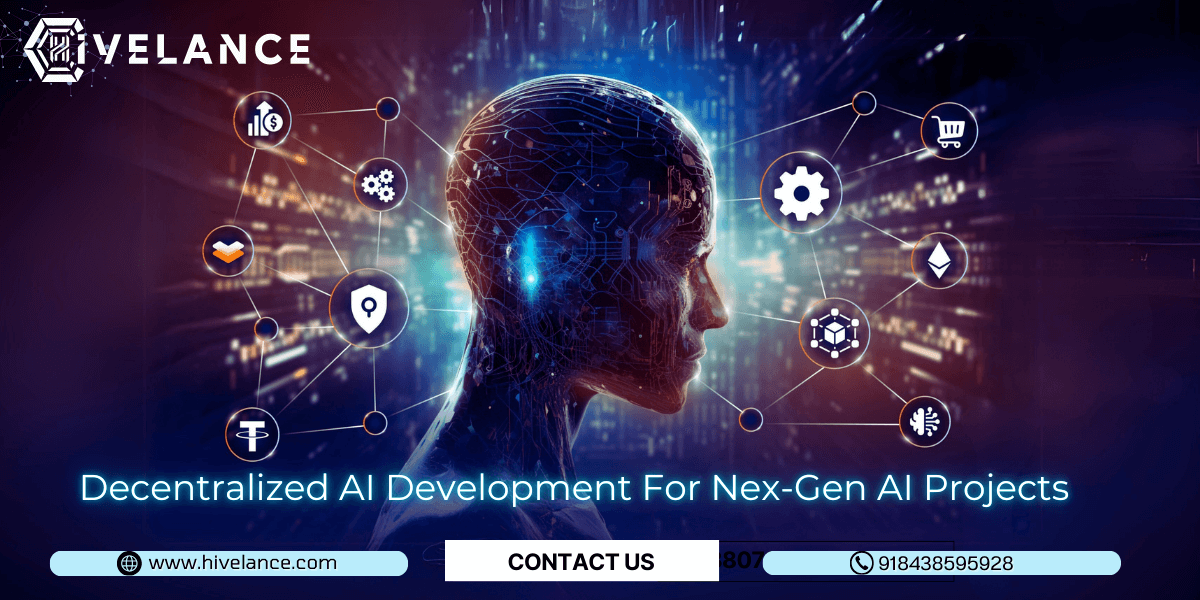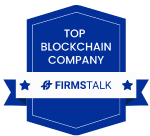Introduction
AI has been rapidly progressing as their offerings are significant in transforming industrial operations. It is widespread among voice-activated assistants boosting their capacities and aiding in the specialized functionalities of many sectors.
A new technology called Decentralized AI is emerging as AI advances.Decentralized AI (DAI), in reaction, is becoming more popular.Historically, the research and use of AI technologies have been dominated by bugger ventures such as Google, OpenAI, and others.
Large data resources and substantial financial support are frequently required for these centralized systems, which raises questions regarding data privacy, transparency, bias, and power concentration. Decentralized AI (DAI) is attempting to transform the field of artificial intelligence by dividing data processing, model training, and governance.
Understanding Decentralized AI
Using distributed networks and blockchain technology, decentralized AI processes, stores, and manages data across multiple nodes instead of depending on a single authority.Individual users can take advantage of AI with this method without giving up control or privacy over their data.With decentralized AI systems, data is processed safely and independently on local devices rather than being sent to a centralized server. Decentralized AI is a paradigm wherein artificial intelligence frameworks are not governed by a single organization or infrastructure, but rather are created, maintained, and deployed over a dispersed network. In contrast to centralized AI, which concentrates all resources and control in one location, decentralized AI increases network flexibility and improves its resistance to disruptions and cyberattacks.
Key Features of Decentralized AI
Federated learning: It enables to train AI models across decentralized devices, enhancing user’s privacy and data. By sharing model updates back to the main network, global models are improved while retaining a decentralized structure.
Decentralized Networks: In order to process data, exchange the essential amenities, decentralized networks are used that are made of interconnected nodes, which can help in reducing the risk of censorship.
Homomorphic Encryption: Homomorphic encryption is usually utilized for maintaining the user’s privacy and data in an integrated way.
Collaborative AI models: Machine learning models are commonly trained collaboratively via decentralized AI, where each node contributes to the overall model without exchanging raw data.
Smart Contracts: Smart contracts is the eminent part of decentralized AI systems to automate agreements without the need for middlemen.
Distributed data: Data in decentralized AI is dispersed across several nodes rather than being kept on a single server. To prevent any one entity from having full access to all information, each node may store a portion of the data or work on its own local dataset.
Blockchain and distributed Ledgers: Decentralized AI is supported by blockchain technology, which offers an unchangeable, transparent record for monitoring AI operations and data transfers. Certain amenities that are supported by decentralized ledger are accountability, security and so on.
Benefits of Decentralized AI
Decentralized AI enhances data security and privacy where huge user data are gathered and stored in one place in a centralized structure, making them open to unauthorized access and hacker attacks.
By establishing its AI network spanning several nations, DcentAI guarantees enhanced resilience. It provides 99.9% uptime and ensures that the distributed system is resilient even in the event of node failures or regional problems, allowing its users to access and operate continuously.
Better scalability than centralized systems is made possible by decentralized AI, which spreads operations across multiple nodes, locations, and participants.
Decentralized models can expand dynamically when additional nodes are added to the network, but centralized systems are constrained by the capacity of their centralized infrastructure.
Without being limited by centralized server resources, it enables AI systems to scale more effectively and manage growing data volumes and computing needs.
They provide amenities that will enable AI businesses to tap into a decentralized computing power and storage network.
Decentralized AI has major benefits in the arena of cybersecurity. Traditional centralized systems often have single points of failure, making them vulnerable to malicious attacks.A more robust cybersecurity ecosystem is promoted by the collaborative nature of decentralized AI, since various stakeholders can pool their resources and skills to enhance security protocols.
Industries that Makes use of Decentralized AI
Finance
Healthcare
Education
Supply Chain
Energy Sector
Web3 and Blockchain applications
Metaverse businesses
Popular Decentralized AI Crypto projects
Ocean protocol
Developing a decentralized platform for data exchange and sharing is the main goal of Ocean Protocol. It enables safe data exchange and monetization for AI and machine learning applications while protecting data privacy. It uses blockchain technology to give data owners control over and the ability to sell their data using data tokens.
Fetch.ai
The open-source, decentralized AI network Fetch.ai is dedicated to empowering self-governing agents to employ machine learning to carry out practical tasks. Working together or individually, these agents communicate and make decisions on a decentralized network.Supply chain optimization, autonomous transportation networks, smart city solutions, and decentralized finance (DeFi) are some of the uses for Fetch.ai's technology.
Trends of Decentralized AI to be expected in 2025
Integration of blockchain technology and AI
Growth of multimodal systems
AI for sustainable development
Democratization of AI access
Incentivized Collaboration
Enhanced security measures
Future of Decentralized AI
The way AI is created, regulated, and used could be completely changed by decentralized AI. Individuals are empowered, transparency is encouraged, and cooperation is stimulated by the shift away from centralized power structures.A more inclusive AI environment is made possible by decentralized AI's emphasis on privacy, security, and democratized access, even though there are still obstacles to overcome.With blockchain technology advancing and the need for data security and privacy increasing, decentralized artificial intelligence (AI) is set to make major breakthroughs by 2025.
Wrapping Up…!!
The development, application, and governance approaches for artificial intelligence are greatly advanced by decentralized AI in 2025. As organizations increasingly recognize the benefits of decentralization such as greater control over data and improved trust, decentralized AI is set to become an integral part of the technological landscape, driving innovation while addressing pressing global challenges. As the leading Decentralized AI development company, Hivelance stands at the forefront of technological advancement for delivering standardized AI outcomes.
 Trends
Trends
 Crypto
Crypto
 Web 3.0
Web 3.0
 AI
AI
 Blockchain
Blockchain
 Fintech
Fintech
 Company
Company



















